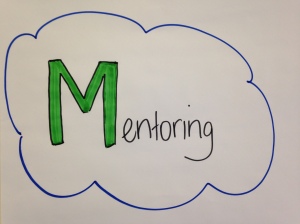 Guest blog by Sharon Honner
Guest blog by Sharon Honner
How many of you have been to Bali? Yes I have been to Bali too!
I was there a couple of weeks ago with my four beautiful children. While we were there my oldest daughter and I visited a butterfly farm and in the nursery we were able to witness butterflies emerging from their Chrysalis, it was an amazing experience.
What does a butterfly farm have to do with Mentoring? As I pondered on what I gained from being a mentor it hit me that one of the most rewarding aspects for me is watching my mentee transform as does a butterfly.
So how did I end up being a mentor? In 2004 I was fortunate to win a bursary to attend the Rural Congress for Women in Spain and as part of that experience I set myself a goal to give back to industry that had supported me to attend.
The first step was, as a volunteer, to join a National Reference Group. At one of the first meetings in Melbourne we had a guest presenter on Mentoring.
My eyes lit up, what a wonderful way to give back to industry; however what I wanted to know was what underpinned being a great mentor?
The lady who presented at the meeting shared that for her it was the art of coaching, so full of enthusiasm, I promptly did some research and enrolled to complete coaching training, from that day forward the coach approach has underpinned the way I facilitate, deliver workshops and mentor.
There are several significant people in my life who have believed in me and given me the confidence to give something new a go. They also have challenged my thinking. On reflection this would have been what I refer to as INFORMAL mentoring.
The downside for me of informal mentoring is that often the relationship is not declared as a mentor/mentee relationship. In fact sometimes INFORMAL mentoring may simply be that I have chosen some-one that I admire to role model myself on or I may choose to support some-one who I can see potential in.
This year I was a Mentor for the YWCA SHE Leads Program. What excited me about the YWCA program is that it’s a FORMAL Mentoring Program. As a volunteer I appreciated that it gave me a start and a finish point.
- Our relationship was declared and I was very privileged and honoured to be partnered with Dr. Lisa Bailey, Programs Manager, RiAus.
- This gave us the opportunity to discuss how we were going to work together giving our relationship the best opportunity to be beneficial to Lisa.
- For example we discussed: what were Lisa’s goals, what motivated her, what were her current challenges, where we were going to meet, when we were going to meet, how we were were going to communicate.
- Also for Lisa how will she know our relationship has been of value?
- For me also because Lisa was sponsored by her workplace it was important Lisa, her Manager and myself met to discuss what his expectations were and also the importance of confidentiality in our relationship.
It is my understanding if someone attends a workshop and then returns home or to the workplace if they do not implement their learnings 80% of that knowledge is lost in 3 months. When you are looking at Return on Investment that is a scary statistic.
Adding coaching or in YWCA’s instance mentoring to a program enables participants to retain up to 90% of their learnings.
Speaking of learnings, I enjoy bringing my own learnings to Mentoring, whether they are good or bad.
As Mentor I bring wisdom, however it is important the Mentee learns by finding their own solutions. An example is that as we support our mentees in reaching for the stars, ask them to take a moment to think about what if things don’t pan out how they had planned. What are their contingency plans?
When I first met Lisa I thought wow I know nothing about science and I have been paired with someone from a pure science background. This brings me to something else I value about mentoring. The skills and strengths I bring to a mentoring relationship doesn’t have to be within my industry, it can be across any industry, and by doing this, it keeps me fresh because the way I think is being constantly challenged.
In summing up what Mentoring gives to me – It is much more than the transfer of knowledge and insights.
I am passionate about women developing their leadership skills and if I can support some-one to reach their goals then I will beam from ear to ear.
Mentoring gives me the opportunity to reflect on my own goals, practices and learnings and deepens my personal leadership and coaching style, it challenges my thinking and keeps me fresh.
To all the prospective Mentors and Mentees may you do as a butterfly does …. emerge and spread your wings.
 Living in the country for most of life I have often been envious of the professional development opportunities and professional association meetings available to my city counterparts. The ability to finish work and join an event with like minded professionals when you work in regional areas requires planning, travel and time.
Living in the country for most of life I have often been envious of the professional development opportunities and professional association meetings available to my city counterparts. The ability to finish work and join an event with like minded professionals when you work in regional areas requires planning, travel and time.







